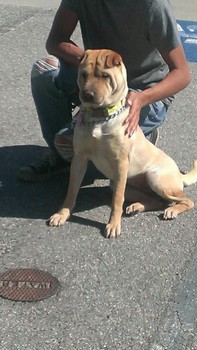After the Final Rose - You and Your Rescue PeiWritten by Elise Loden. Director and founder of Chinese Shar Pei Network, Inc. So you fell in love with a rescue pei, filled out an application, passed a home visit, and signed an adoption contract. The honeymoon is over, now the real work begins! To ensure a long and happy life together, please follow these basic guidelines for new dog guardians. First, please realize that change is hard for everyone, and that includes your new rescue pei. Rescue dogs need time to adjust to their new environment and learn what is expected of them. Adopters need to remember that their new family member has just been through a traumatic life experience and may still be sad or stressed. They may still be grieving the loss of their family, the trauma of a kill shelter, or the confusion or upheaval after leaving boarding or a foster home. Know that with love, patience and understanding, a successful transition will likely occur within a month. The first 30 days with your new dog are the most critical. Before you allow your new dog into your home, take him/her for a walk outside to relieve themselves. Keep your new dog on a leash while entering your home for the first time. It is important for you to be physically present with your new dog for a few days in order to bond and establish ground rules. Maintain a calm, quiet atmosphere. Slow introductions and a crate will help during this transition period. Keep your new dog separate and introduce him/her slowly to other people and pets. The dog will need to learn both your communication style and your schedule. Be prepared for the worst! Your new dog may have housetraining accidents, may chew on furniture or possessions, may attempt to escape, may exhibit nervous behaviors such as whining, barking, pacing, may have an upset stomach, etc. All these things are considered normal adjustment behavior. During the first days with you, few demands should be made on your new dog. No talk, no touch, no eye contact. Don't force the dog to interact with you, let him/her come to you when they are ready. Keep the dog supervised by using a crate or tying their leash to heavy furniture in your vicinity or to your waist. Limit the dog to one room or area. Establish a consistent routine and stick to it. Take the dog on walks, set up a place for their food and water, set a schedule, show them where they may relieve themselves and pay attention to signals that they may need to relieve themselves. Gradually extend unsupervised time. Do not leave your dog unsupervised or alone with other pets until you have carefully monitored them and know that they may be trusted together. Show your new dog that you are the pack leader and teach him/her what you consider to be acceptable behavior. Show them what you consider off-limits. Be firm, but calm. Adjustment takes time, but your patience and positive reinforcement during this critical period will be rewarded. If your dog refuses to eat, you may need to adjust their food. Ideally, you should feed the dog the same food he/she was eating prior to coming to you. If the dog refuses to eat for more than two days, you should consult your vet. If the dog has indigestion or diarrhea that persists for more than a day, please contact your vet. Know that even if your dog has been housetrained, changes in schedule and food will likely result in some accidents during the adjustment period. The use of a crate will help immensely. The crate can gradually be phased out as your dog learns what is expected. When your new dog is submissive and acting calmly, holding the head low, ears relaxed and slightly back, this is the time to pet him/her. The dog might curl into a circle, basically becoming smaller, this indicates that he/she does not wish to alpha. If your dog lowers his/her head and turns away from you, this is not sadness, instead he/she is trying to tell you that you may now have the leadership position. If you have made it this far, congratulations! Your patience and perseverance will pay off and result in a wonderful furever relationship filled with unconditional love and companionship. To further strengthen your bond and learn how to control behavior, you may also want to enroll in obedience classes. May you have a long and happy life with your rescue pei. |
